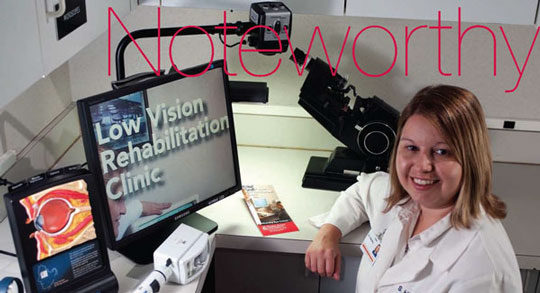Ferris State Alumni Association
420 Oak Street, Big Rapids
(231) 591-2345
"Because I had poor eyesight as a child, I've always wanted to help other people maximize vision," says Dr. Sarah Hinkley (O'04), Michigan College of Optometry assistant professor, chief of Low Vision Services and 2009 Michigan Young Optometrist of the Year.

Hinkley, a Ferris State Honors program graduate, began her professional career at a large private practice in Maumee, Ohio, concentrating on contact lenses, pediatrics, vision therapy and learning-related vision disorders. Her career soon led her back to her alma mater, where she found herself on the 'other side' of the desk. The transition from Ferris State student to faculty member felt very comfortable, Hinkley recalls.
I never felt like an outsider ... I was honored that I could come back and work side by side with faculty whom I had so much respect and admiration for."
Hinkley and her colleagues are busy preparing for their move into their long-awaited new facility, the Michigan College of Optometry/ Center for Collaborative Health Education. They will soon be teaching in a new, state-of-the-art facility that will provide the opportunity for even more comprehensive rehabilitation of patients with visual impairments.
The addition of a clinic room housing the latest vision rehabilitation technologies will give patients access to cutting-edge products to enhance their quality of life. A home environment room will simulate a patient's living areas, including the kitchen, living room, television viewing area and even grocery store shelving, allowing for more comprehensive and inter-disciplinary vision rehabilitation," adds Hinkley.
In the new facility, opening in early 2011, students will be exposed to a truly multidisciplinary approach to vision rehabilitation, not only with magnification devices but solutions for daily living activities that are so important to patients.
My goal is to provide students with confidence about their role in working with visually impaired patients and demonstrate the significant impact they can have on the everyday life of these patients. I also wish to demonstrate the role of optometry in the world of vision rehabilitation, including the productive relationships with other professionals and organizations necessary to deliver comprehensive rehabilitative care."
The new building will provide Hinkley with the opportunity to teach students about vision rehabilitation with current technologies and resources. It will also serve as a beacon to the community and surrounding areas about the availability of services for visually impaired and legally blind patients.
These services are greatly needed and currently under-utilized because of lack of public knowledge of their existence. With an aging U.S. population, the number of visually impaired people is expected to double over the next few decades. The need for vision rehabilitation services will be increasing rapidly and we are pleased to offer clinical services to meet this demand," Hinkley says.
Hinkley chairs the Michigan Optometric Association's Healthy Eyes Healthy People 2010 Committee and has received four national grants for the Association focusing on sports eyewear protection for children, low vision rehabilitation and glaucoma awareness. Additionally, she has a passion for recruiting students into the optometry profession and working with adults and children who are visually impaired or legally blind. She is a certified Michigan Low Vision Specialist and a new Fellow of the College of Optometrists in Vision Development, an organization devoted to advancing excellence in optometric vision therapy through education and board certification.